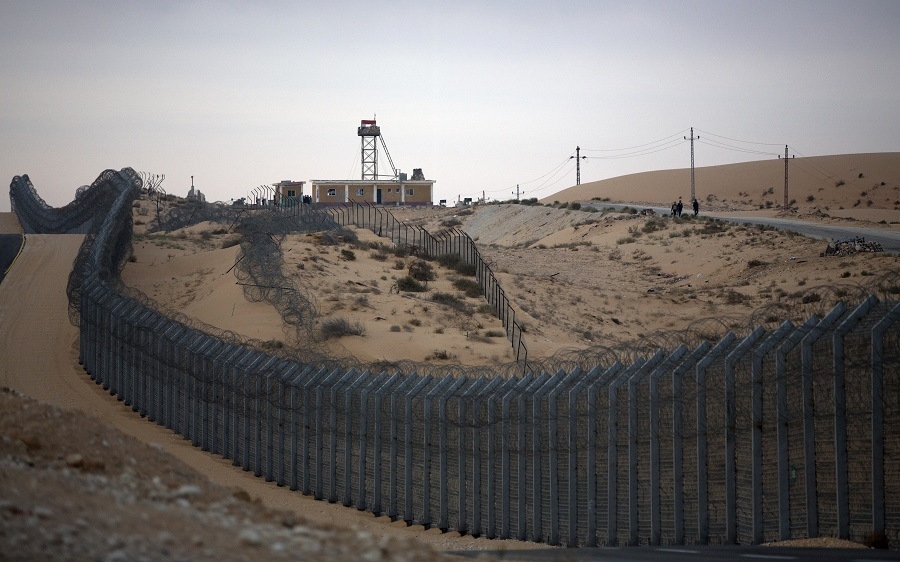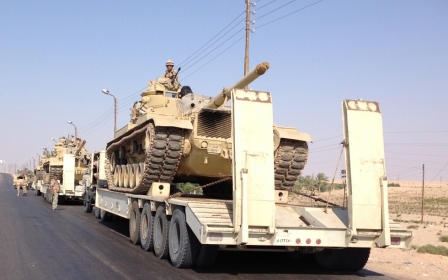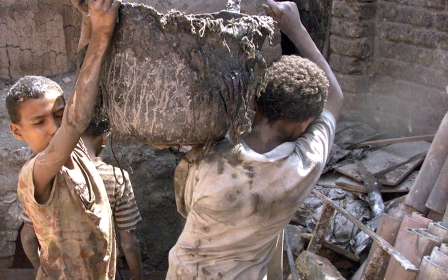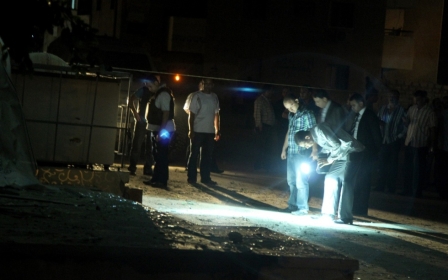Egyptian army kills second Ansar Bait al-Maqdis leader

RAFAH - The Egyptian Army on Friday killed a leader of the country's most active militant group, the Sinai-based Ansar Bait al-Maqdis (ABM), according to a report on al-Arabiya, which cited a military spokesman on Facebook.
The action follows the killing of 16 members of the group last Tuesday, the same day that ABM executed four Egyptian Bedouins. Egypt said last week it had killed a field commander of ABM, Mohammad Abu Shatiya, in clashes south of Rafah, a city in north Sinai near the border with Gaza.
Shehata Farhan, the leader killed on Friday, was implicated in operations targeting police and security forces and was killed during a raid in Rafah, the army spokesman said.
ABM claimed that one of the four Bedouins executed was killed for "collaborating with the Egyptian army", and the other three were slaughtered for "collaborating with Israeli Mossad". The first was executed by a gun, the other three were beheaded. Collaboration is viewed locally as spying.
In a 26-minute video clip, released by ABM, titled "They are the enemy, watch out", one of the group's leaders, identified as Abu Osama al-Masri, says that coordination between the Egyptian and Israeli armies has reached a high level.The video borrows some statements from the spokesman of Islamic State (IS), Abu Mohammed al-Adnani, where he explains how to take revenge upon "infidels" and "apostates", including bombing the homes of such people viewed as within this category.
The group's members appear with faces covered in black masks standing over the four kneeling captives, while a militant reads out a statement. There is no recording of the actual beheadings, but footage of the severed heads is shown later.
In one part of the video showing the home of 51-year-old Egyptian national Abdelmajeed al-Meni, the group showed a copy of his ID as proof that he has worked for the "army of apostasy", as they refer to the Egyptian Army. His family and children were taken outside the home, and militants destroyed it and burnt it down.
Another scene shows Ahmed Ayyad, a Bedouin youth in Sinai, who explains how he began work as an informer for the Egyptian military, which used him to gather information about wanted people. In the video, Ayyad asks all people for "repentance" and to join the Mujahedeen before it is too late, in order not to come to the same end as himself. The video shows Ayyad being shot dead, with a written comment: "No harm if he repented before he was caught."
At the end of the video clip, the group displays three males from Bedouin tribes of Sinai who admit that they collaborated with Israeli Mossad, met frequently with Mossad officers and describe the money they earned for passing across information.
One of the captives says: "Israeli Mossad officers offered me a car and weapon to form a military group and target the Mujahedeen."
Those three were executed after they identified themselves and confessed to collaboration. Several of the large Bedouin tribes in Sinai have had family members killed for collaborating with Israel - an act historically considered as very shameful for the person involved and their family.
ABM said that the men provided Israeli intelligence with information that led to the killing of three members of the group in an airstrike on 23 July in northern Sinai. At the time, the Egyptian Army said that no Israeli fighter jets had crossed into Egyptian airspace.
The group says that it aims to fight Israel, but security officials in Sinai say there are no established connections between ABM and Palestinian military groups.
A warning to the Sons of Sinai
Abu Osama al-Masri warns in a video to all sons of Sinai tribes in collaboration with Egyptian government that they will be severely punished, calling on them to stand by ABM in facing the Egyptian Army.
Since 2011, ABM, or "Supporters of the Holy House", have become very active in the Sinai Desert and have a strong relationship with Islamic State groups in Iraq and Syria. Often, both sides praise each other and vow to continue fighting against any Arab army declared by these groups as an "apostasy army".
An Egyptian security official speaking to Middle East Eye on condition of anonymity given the sensitivity of the topic, stated that the group is active in Sinai and has been involved in several attacks, including a failed attempt to assassinate a former minister of interior last year.
The group stands behind 13 bombings of gas pipelines connecting Egypt and Israel, and has made it clear that those supplying Israel with natural gas are "infidels" and "treasonous" and has suggested that Egyptian gas will expire in five years.
In one of ABM's videos, al-Qaeda leader Ayman al-Zawahiri is shown praising those who bombed the gas pipelines, stating "they are those who don't accept injustice".
A senior Egyptian security official in Sinai said that membership of ABM is estimated at no more than 200 members in north Sinai, with 95 percent of them from Bedouin clans who are affected by the Wahhabi way of thinking, while about 5 percent come from outside Egypt. In Egypt, the group is declared to be a "terrorist" group.
The same source told Middle East Eye that "many of those youth been to Pakistan and Bangladesh for 'dawa' [proselytising of Islam], where al-Qaeda members encountered them and adopted their thinking without [their] being affiliated to al-Qaeda".
Such videos of killings in Sinai are similar to those released by Islamic State in Iraq and Syria. Egyptian security said it is the first time such decapitations have been made public in Egypt. Though there is no clear direct link between IS and ABS, one of the leaders in Sinai states they received advice last week from IS on "how to be more effective".
In December 2013, the group bombed a police compound in Mansoura city, about 130 kilometres north of Cairo, killing at least 16 people, including 14 police officers. The group also mounted an attack on Israeli troops in September 2012.
Security sources in Egypt say the group appears to actively use social media, including Twitter, to connect with its members. Most of the group’s activities are tweeted and video clips released on YouTube.
Sinai is still seen as a remote but very strategic part of Egypt, where the Suez Canal, known as "the pillar of Egyptian economy", is located. After ABS issued warnings to tourists on 20 February this year, local tourism suffered hugely.
In the form of retaliation, the Egyptian Army raided several places of the group in Sinai villages on Tuesday. The army announced the killing of 16 ABM members following an overnight military campaign.
Yet, the high ranking security source says about 50 percent of these groups are under control. But when his staffers bring those convicted for investigation, he finds that many of those are mentally ill who need rehabilitation.
"One has to realise there are reasons for such individuals to do what they do and among those are unemployment and a cultural and intellectual vacuum."
Other locals in Sinai who preferred not to say their names in order not to appear to be defending the group, say injustice of distribution of resources and jobs are other reasons for turning such youth into extremists.
New MEE newsletter: Jerusalem Dispatch
Sign up to get the latest insights and analysis on Israel-Palestine, alongside Turkey Unpacked and other MEE newsletters
Middle East Eye delivers independent and unrivalled coverage and analysis of the Middle East, North Africa and beyond. To learn more about republishing this content and the associated fees, please fill out this form. More about MEE can be found here.




